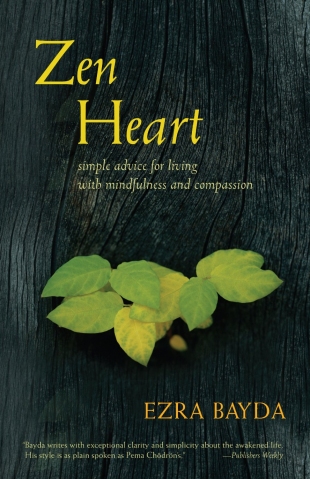Ezra Bayda teaches at Zen Center San Diego and is featured in our Living Spiritual Teachers Project. In this jewel of a book, he examines some of the spiritual practices that go into living a life of awareness, appreciation, and kindness. He includes advice on dealing with fixed ideas, addictions, fears, and emotions that are roadblocks on the path of mindfulness. At the core of this multidimensional work is the spiritual practice of being present:
"Peace — that sense of inner calm we all aspire to find — is not found through striving to attain it. It's found only through residing fully and completely in what is, whether it be the most peaceful or the most tumultuous experience of our life. Only by residing in what is, exactly as it is, will our self-imposed prison walls come down. And when they do, all that remains is the connectedness that we are."
The book is divided into sections on "The Me Phase of Practice" which probes our essential beliefs about ourselves, "Being Awareness" in which we cultivate a larger sense of what life is, and "Being Kindness" in which we connect with the love that is our true nature and learn to operate from that place of kindness and compassion.
It is amazing to consider how much of our time and energy is consumed with thoughts that pass through our minds. Bayda begins taking a hard look at three habitual grooves in our mental world: analyzing, blaming, and fixing. The blame game is one we all practice and as the author correctly points out, it has a certain juice or power, almost like an addiction. This habit provides an escape from "the anxious quiver of our own experience."
Another dimension of the Me Phase are the strategies of control — trying harder, seeking approval, and escaping/numbing. These pesky actions all stem from our attempts to have things go our way and our belief that we are entitled to comfort, pleasure, and ease. We would be much better off relying upon the three pillars of practice: daily sitting, practicing with everyday life, and deepening practice through meditation retreats. These draw out perseverance, curiosity, and mercy, essential qualities on the spiritual path. As we deal with our emotions and other hindrances, Bayda suggests we ask three questions:
• Can I welcome this as my path?
• What is my most beloved thought?
• What is this?
In the last section of the book, the author ponders some heavy issues including the student-teacher relationship, transforming anger, the things we fear most (insecurity and helplessness, aloneness and disconnection, and unworthiness), relationships and love. Bayda always gives spiritual practices and here you will find three heart meditations, a practice called the Nonmanifestation of Negative Emotions, and three vows. Also the following wise counsel:
"If you remember nothing else, always remember this one great secret of spiritual practice: we don't have to feel any particular way. We don't have to have special experiences. Nor do we have to be any particular way. With whatever arises, whether it's pleasing or not, try to remember that all we can do is experience and work with whatever our life is, right now. No matter what life is and no matter how we feel about it, all that matters in practice is whether we can honestly acknowledge what is going on, and then stay present with the physical experience of that moment. This is the way we come to experience true appreciation for our lives."
